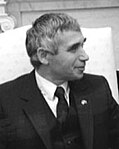
Presidential elections were held in Croatia in January 2000, the third since independence in 1991. They were also the first early presidential elections, as they were held due to the death of incumbent president Franjo Tuđman on 10 December 1999, as well as being the last elections held under the semi-presidential system of government, by which the President was the most powerful official in the government structure and could appoint and dismiss the Prime Minister and their cabinet.

Presidential elections were held in Slovakia on 3 April 2004, with a second round on 17 April. Although former Prime Minister Vladimír Mečiar received the most votes in the first round, he was defeated by Ivan Gašparovič in the run-off.
Presidential elections were held in Bulgaria on 11 November 2001, with a second round on 18 November. The result was a victory for Georgi Parvanov of the Bulgarian Socialist Party, who won 54.0% of the vote in the second round, defeating incumbent president Petar Stoyanov. Voter turnout was 41.8% in the first round and 55.1% in the second. Parvanov took office in 2002, becoming the first former communist to hold the post since 1990.

Parliamentary elections were held in Belarus on 17 October 2004, with a second round of voting in two constituencies on 27 October, and a third round in one on 20 March 2005. The vast majority of successful candidates, 97 of 109, were independents. Voter turnout was reported to be 91.04% in the first round.
Presidential elections were held in Moldova on 17 November 1996, with a second round on 1 December. Whilst incumbent President Mircea Snegur received the most votes in the first round, he was defeated in the second by Petru Lucinschi.

Presidential elections were held in Finland on 16 January 1994, with a second round on 6 February. It was the first time the President had been solely and directly elected by a popular vote. Martti Ahtisaari defeated Elisabeth Rehn in the second round.

Parliamentary elections were held in Andorra on 9 December 1981, with a second round of voting on 16 December. Local elections were held on the same day. Following the elections, Òscar Ribas Reig became the country's first Prime Minister.
Presidential elections were held in Cyprus for the first time on 13 December 1959. Only two candidates contested the election; Makarios III, who was backed by EOKA and Ioannis Clerides, a member of the Democratic Union, who was also supported by AKEL. The result was a victory for Makarios III, who won 66.8% of the vote, although he did not take office until 16 August 1960. Voter turnout was 91.2%.
Presidential elections were held in Cyprus on 25 February 1968. The result was a victory for the incumbent President Makarios III, who received 96% of the vote. Voter turnout was 93%.

Senate elections were held in the Czech Republic for the first time on 15 and 16 November 1996, with a second round on 22 and 23 November. the first after independence. The result was a victory for the Civic Democratic Party, which won 32 of the 81 seats. Voter turnout was 34.9% in the first round and 30.6% in the second.
General elections were held in Italy on 27 January 1861, with a second round on 3 February. The newly elected Parliament first convened in Turin on 4 March 1861, where, thirteen days later, it declared the unification of the country as the Kingdom of Italy.
General elections were held in Italy on 29 October 1882, with a second round of voting on 5 November. The "ministerial" left-wing bloc emerged as the largest in Parliament, winning 289 of the 508 seats.
Presidential elections were held in Slovenia on 8 April 1990, with a second round on 22 April. Voters elected the four members of the presidency and the President of the presidency. Ciril Zlobec, Ivan Oman, Matjaž Kmecl and Dušan Plut were elected to the presidency, whilst Milan Kučan was elected President in the second round.

General elections were held in Macedonia on 16 October 1994 to elect a President and Assembly, with a second round of Assembly elections on 30 October. The presidential election was won by Kiro Gligorov of the Alliance for Macedonia, whilst the parties forming Alliance for Macedonia also won the Assembly elections with 95 of the 120 seats. However, the second round of the Assembly elections were boycotted by VMRO-DPMNE and the Democratic Party, as they claimed there had been irregularities in the first round.

Parliamentary elections were held in the Socialist Republic of Macedonia on 11 November 1990, with a second round on 25 November. They were the first competitive elections in the country's history. VMRO-DPMNE emerged as the largest party, winning 38 of the 120 seats.

Federal elections were held in Switzerland on 27 October 1872. The Radical Left remained the largest group in the National Council.
Events in the year 1992 in Bulgaria.
Events in the year 1993 in Cyprus.
Events in the year 1988 in Cyprus.
Events in the year 1999 in Ukraine.








